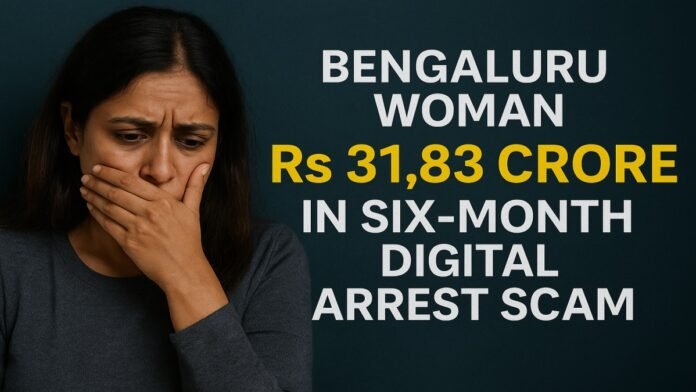
Key Points
- 57-year-old Bengaluru software engineer lost ₹31.83 crore in Karnataka’s biggest digital arrest scam spanning September 2024 to March 2025
- Fraudsters impersonated DHL executives and CBI officers, keeping victim under continuous Skype video surveillance for six months
- Scam began September 15, 2024, with fake parcel seizure claim involving three credit cards, four passports, and MDMA drugs
- Victim made 187 transactions including ₹2 crore “surety amount,” “tax” payments, and “processing charges” after liquidating fixed deposits
- Impersonators Mohit Handa, Rahul Yadav, and fake CBI officer Pradeep Singh monitored her via camera, threatened family, and verbally abused her
- Woman delayed filing complaint until after son’s June 2025 wedding, fearing repercussions and believing refunds would come by February
Bengaluru: In what authorities are calling Karnataka’s largest-ever “digital arrest” cybercrime case, a 57-year-old software engineer from Bengaluru was systematically defrauded of ₹31.83 crore over six months, during which she was kept under near-constant video surveillance and psychological confinement by sophisticated scammers. The victim, who has not been publicly identified, approached Bengaluru police to file a formal complaint after months of ordeal, realizing she had been duped when promised refunds never materialized following her son’s wedding in June 2025.
The case represents a disturbing evolution of digital arrest scams in India, where fraudsters use extended psychological manipulation, continuous video monitoring, and impersonation of multiple law enforcement agencies to extract massive sums from victims. Unlike typical cybercrimes that conclude in hours or days, this elaborate scheme spanned nearly six months, with the victim living in fear and virtual captivity while transferring her life savings to the criminals.
Scam Begins With Fake DHL Parcel Call
The elaborate fraud commenced on September 15, 2024, when the woman received a phone call from someone claiming to be an executive with DHL, the international courier service. The caller informed her that a package addressed in her name, containing three credit cards, four passports, and MDMA (a prohibited drug), had arrived at the DHL center in Andheri, Mumbai. When she protested that she lived in Bengaluru and had no connection to any such parcel, the caller claimed it could be the work of cybercriminals who had misused her identity since her phone number was linked to the package.
The fake DHL representative suggested she should report the matter to the cybercrime police to clear her name. Before she could end the call or take any action independently, the call was seamlessly transferred to another number, where a person identifying himself as a CBI (Central Bureau of Investigation) officer came on the line. This smooth transition from courier company to law enforcement impersonation is a hallmark of sophisticated digital arrest scams, designed to prevent victims from having time to think critically or seek outside advice.
Virtual House Arrest Via Video Surveillance
The impersonator claiming to be a CBI officer issued stern warnings, telling the woman not to approach the police or inform anyone, including family members, claiming that the cybercriminals who had misused her identity were actively surveilling her house. He threatened to implicate her family members if she told anyone about the investigation. With her son’s wedding scheduled for December, the woman feared the repercussions of an alleged criminal investigation and complied with the scammers’ instructions.
Over the following days, she was instructed to install two Skype IDs on her devices, through which the fraudsters maintained continuous video surveillance of her activities. A man identifying himself as Mohit Handa allegedly watched her through her phone camera for two days, claiming she was under “house arrest” and needed to remain visible at all times. After Handa’s monitoring period, another impersonator named Rahul Yadav took over surveillance duties for approximately one week. During this extended surveillance period, the woman worked from home, kept her camera on continuously, and followed the scammers’ instructions out of fear.
Fake CBI Officer Escalates Threats
The psychological pressure intensified when a third impersonator, identifying himself as senior CBI officer Pradeep Singh, took control of the operation. On September 23, 2024, Singh conducted a video interrogation with the victim while she was at a hotel, verbally abusing her, issuing threats of immediate arrest and custody, and demanding she “prove her innocence”. He instructed her to declare all her assets to the Reserve Bank of India’s Financial Intelligence Unit as part of the alleged investigation.
The fraudster’s tactics combined authoritative impersonation of government officials with psychological manipulation, creating an environment of fear and isolation that prevented the victim from seeking help or questioning the legitimacy of the demands. The continuous video surveillance served multiple purposes: maintaining psychological control, ensuring the victim remained isolated from family and friends who might recognize the scam, and monitoring her compliance with instructions to transfer funds.
187 Transactions Totaling Rs 31.83 Crore
Beginning on September 24, 2024, and continuing through early November, the victim revealed her complete financial details to the scammers and began making large-scale transfers from her bank accounts. She liquidated her fixed deposits and other savings, transferring money in 187 separate transactions as directed by the fraudsters. Between October 24 and November 3, 2024, she deposited a supposed “surety amount” of ₹2 crore, which the scammers claimed was necessary to secure her release from the investigation.
Following the surety payment, the fraudsters demanded additional payments labeled as “taxes” that needed to be paid to clear the case and receive refunds. The scammers assured her that all the money would be returned by February 2025, well before her son’s engagement ceremony scheduled for December. This timeline was critical to securing her cooperation, as she needed her financial resources for the upcoming wedding expenses and was motivated to resolve the alleged investigation quickly.
After December 2024, the fraudsters continued demanding “processing charges” for the supposed refund, repeatedly postponing the promised return of funds from February to March 2025. The scammers maintained regular communication through this period, extending the fraud and extracting additional payments under various pretexts. By the time all transactions were completed, the woman had transferred approximately ₹31.83 crore of her life savings to accounts controlled by the criminal network.
Victim Realizes Deception After Wedding
Communication from the scammers abruptly ceased after a few days in March 2025, with no refunds forthcoming as repeatedly promised. The woman, who had been assured her money would be returned, finally realized she had been the victim of an elaborate fraud. However, she waited several additional months before filing a police complaint, prioritizing her son’s wedding in June 2025 over immediate legal action.
Only after the wedding concluded did she approach Bengaluru police to file a formal complaint, providing detailed documentation of the 187 transactions and describing the months-long ordeal of virtual surveillance and psychological manipulation. In her complaint, she stated: “In total, through 187 transactions, I stand deprived of approximately Rs 31.83 crore,” urging authorities to thoroughly investigate the sophisticated criminal racket. Police have now registered a First Information Report (FIR) and launched a comprehensive investigation into Karnataka’s biggest-ever digital arrest scam.
Digital Arrest Scams Proliferate Across India
The Bengaluru case represents the most extreme example of a growing cybercrime trend in India known as “digital arrest,” where fraudsters impersonate law enforcement officials and claim victims are under investigation or house arrest, demanding payments to resolve fabricated cases. These scams typically begin with allegations of involvement in drug trafficking, money laundering, or other serious crimes, often linked to fake courier parcels or compromised identity documents.
The psychological tactics employed by digital arrest scammers include continuous video surveillance to prevent victims from seeking outside help, threats against family members to ensure compliance, verbal abuse and intimidation to break down resistance, and creation of elaborate role-playing scenarios involving multiple fake officials to enhance credibility. The extended duration of the Bengaluru case, spanning six months rather than the typical few days, demonstrates the increasing sophistication and patience of cybercriminal networks operating in India.
Expert Recommendations For Protection
Cybersecurity experts and law enforcement agencies have issued urgent warnings about digital arrest scams and provided specific guidance to help citizens protect themselves. Critical precautions include: never trust calls from unknown numbers claiming to be from law enforcement or government agencies without independent verification; demand official identification and verify credentials through official government channels before engaging with anyone claiming to be a police or CBI officer; understand that no legitimate law enforcement agency will ever ask civilians to transfer money from personal bank accounts as part of an investigation; refuse demands to install video calling applications or remain under continuous surveillance, as these are hallmarks of digital arrest scams; immediately disconnect and contact local police if you receive suspicious calls involving threats, allegations of criminal activity, or demands for payments; never make financial decisions under pressure or time constraints imposed by callers; and inform family members or trusted friends immediately if you receive such calls, as scammers rely on isolation to maintain control over victims.
Law enforcement officials emphasize that legitimate investigations follow formal procedures, including in-person meetings at police stations, properly documented summons delivered through official channels, and never involve demands for immediate payment or virtual house arrest via video calls. The Bengaluru case underscores the devastating financial and psychological impact these scams can have, particularly on victims who delay reporting due to fear, shame, or concern about family events.
Parallel Bengaluru Parcel Scam Case
In a related but separate incident highlighting the proliferation of parcel-related scams in Bengaluru, a 78-year-old resident of JP Nagar approached Cyber Crime Police on October 26, 2025, after receiving a fraudulent Cash on Delivery (COD) parcel allegedly dispatched by a Delhi-based company. On October 11, 2025, the senior citizen received a package addressed to his daughter from a well-known courier service, containing a 90-gram Korean peel-off face mask priced at ₹699. When he verified with his daughter, she confirmed she had never ordered any such item.
Upon visiting the courier company’s Puttenahalli branch, he learned the parcel had been sent from a Delhi-based firm, and online searches revealed numerous complaints from victims across India who had fallen prey to similar COD delivery scams. Police registered a case under the Information Technology Act and relevant sections of the Bharatiya Nyaya Sanhita for cheating and impersonation, summoning representatives connected to the company for questioning. According to investigators, the scam involves companies harvesting personal data and addresses from social media platforms to send unsolicited parcels, tricking recipients into paying small amounts for worthless or counterfeit products. While individual losses are small, the large scale of operations makes these scams profitable for criminals, and most victims don’t file complaints, allowing the fraud to persist.






















































